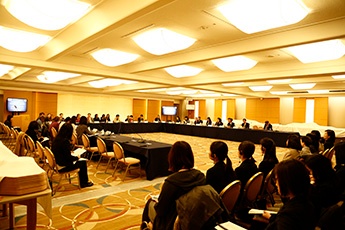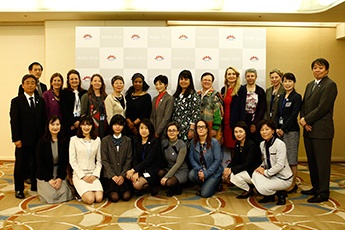Women's Issues
G7 WINDS Special Event: Shining Future of Women in STEM fields


G7 WINDS special event “Shining Future of Women in STEM fields” was held in Tokyo on 13 December, 2016. This event was a part of the initiative called WINDS (Women’s Initiative in Developing STEM career) which was launched at the G7 Ise-shima Summit. H.E Ms. Phumzile Mlambo-Ngcuka, executive director of UN Women, Dr. Yuko Harayama, executive member of council for science, technology and innovation (CSTI), G7 WIMDS ambassadors and representatives, OECD, business and academic representatives, students and others attended. (Challenges and policies on women in STEM were also discussed at WAW! 2016 the High Level Roundtable “Developing Capacity of Women and Promoting Their Active Roles in STEM”.)
H.E Ms. Phumzile Mlambo-Ngcuka made a keynote speech saying that it was important that G7 would be able to help and support the agenda within and beyond the country that enhanced the participation and empowerment of women and girls. Touching upon the work in informal sector, early marriage, digital divide and so on, she emphasized the importance of education including STEM fields as a solution.
G7 WINDS ambassadors and representatives and OECD made presentations on their own experiences as role models and vision of women’s STEM career as well as current situations and efforts in each country followed by the discussion. Major points are as follows.
1 The situation on women in STEM fields
- In several presentations, it was mentioned that the share of women in physics and engineering was especially low in STEM fields. Ms. Naoko Yamazaki (astronaut, Japan) said that the share of female astronauts was only about 10% and Dr. Mary Wells, professor of mechanical and mechatronics engineering at the University of Waterloo (Canada) said that the share of women who worked in engineering sector after graduation was only about 12%. On the other hand, Ms. Viviane Willis- Mazzichi, head of sector gender-directorate general research & innovation, European Commission (EU) said that the share of women in the European Union (28 countries) who graduated at PhD level in 2012 in all fields of science was 47.3%, it was lower in average in mathematics and physics, however close to 50% in some countries.
- H.E Ms. Phumzile Mlambo-Ngcuka explained the data that about 88.4% main characters were men and about 11.6% were women in STEM related films. Dr. Simona Settepanella, professor of department of mathematics at Hokkaido University (Italy) also explained the data that only about 12% were women in STEM related interviews in Italy.
- Montserrat Gomendio, deputy director of the directorate for education and skills, OECD explained the result of the survey that there were only minimal differences between 15-year-old boys and girls in their performance in science, but girls were less confident in their ability at science.
- Several participants pointed out that girls and parents didn’t know well about STEM career.
- In several presentations, it was mentioned that one of the obstacles for girls to go into STEM career was stereotypes, STEM career didn’t fit the image of girls’ future that parents and teachers had in mind, so they discouraged girls to go into STEM career and many girls followed their advices. OECD Programme for International Student Assessment (PISA) shows that parents are more likely to expect sons rather than daughters to enter STEM careers. Dr. Mac Donald, professor emeritus at the University of Reading (UK) also mentioned that there was a gap between girls’ self-identifying and the image of scientists.
- Dr. Settepanella shared her own experience that even though her father urged to study law, she chose mathematics because she liked it very much. It was shared that “passion” of each girl was important as well as the removal of stereotypes.
2 Efforts to promote the advancement of women and girls in STEM career
- In several presentations, it was mentioned that showing role models was an effective way to encourage women and girls to go into STEM and showing nearby and friendly women in STEM fields was beneficial.
- Dr. MacDonald introduced a quiz
 which enable girls to know themselves and suitable career in STEM fields.
which enable girls to know themselves and suitable career in STEM fields. - In several presentations, it was mentioned that it was necessary to further strengthening networks for women and girls in STEM career, and institutional reform to make systems more women friendly.
- Many kinds of STEM related seminars and programs are conducted in each country. Dr. Wells explained various seminars and programs for parents and girls. Mr. Tomoki Kawakami, project general manager of human resources division at Toyota Motor Corporation, and Mr. Tetsuya Shioiri, general manager, vibrant workplace promotion section, Human Resources Department, Taisei Corporation explained their efforts to introduce their jobs to young people.
- Considering the lack of women’s appearance in media, the further action is necessary so that women in STEM would be taken up in media and this idea obtained broad support from participants.
3 Next steps
Sharing good practices and adopting them to each county would make it possible to realize the advancement of women in STEM fields. Japan would like to further raise promote this initiative with the cooperation of WINDS ambassadors. Italy, as the G7 presidency in 2017, expressed that it would continue to take up this issue.



 (Open a New Window)
(Open a New Window)